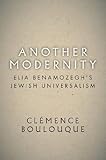Another modernity : Elia Benamozegh's Jewish universalism / Clémence Boulouque.
Material type: TextSeries: Stanford Studies in Jewish History and Culture SerPublisher: Stanford, California : Stanford University Press, [2020]Copyright date: ©2020Description: 1 online resource (xii, 309 pages)Content type:
TextSeries: Stanford Studies in Jewish History and Culture SerPublisher: Stanford, California : Stanford University Press, [2020]Copyright date: ©2020Description: 1 online resource (xii, 309 pages)Content type: - 9781503613119
- 1503613119
- 296.120092 23
- BM755.B46
- online - EBSCO
| Item type | Current library | Call number | URL | Status | Notes | Barcode | |
|---|---|---|---|---|---|---|---|
 eBook
eBook
|
Biblioteca "Angelicum" Pont. Univ. S.Tommaso d'Aquino Nuvola online | online - EBSCO (Browse shelf(Opens below)) | Online access | Not for loan (Accesso limitato) | Accesso per gli utenti autorizzati / Access for authorized users | (ebsco)2492941 |
Includes bibliographical references and index.
Online resource; title from PDF title page (EBSCO, viewed June 11, 2020).
Part I. Benamozegh's texts and contexts : Morocco, the Risorgimento, and the disputed manuscript -- The Moroccan world of a Livornese Jew -- An Italian Jewish patriot in the Risorgimento -- The banned author and the oriental Publisher -- Expanding his readership : Benamozegh's turn to French -- The afterlives of a manuscript -- Part II. Universalism as an index of Jewish modernity -- Situating Benamozegh in the debate on Jewish universalism -- Normativity and inclusivity in modernity : the role and limits of the Noahide Laws -- Cosmopolitanism and universalism : the political value of Judaism in an Age of Nations -- Universalism in particularism : Benamozegh's legacies, between Levinas and religious Zionism -- Part III. Beyond binaries : Kabbalah as a tool for modernity -- Kabbalah : reason and the power of myth -- Beyond dualism : Kabbalah and the coincidence of opposites -- Kabbalah as politics -- Part IV. Past enmity : modes of interreligious engagement and Jewish self-affirmation -- Religious enmity and tolerance reconsidered -- "The iron crucible" and loci of religious contact -- Self-assertion and a Jewish theology of religions -- Modes of interreligious engagement : from theory to social practices.
Another Modernity is a rich study of the life and thought of Elia Benamozegh, a nineteenth-century rabbi and philosopher whose work profoundly influenced Christian-Jewish dialogue in twentieth-century Europe. Benamozegh, a Livornese rabbi of Moroccan descent, was a prolific writer and transnational thinker who corresponded widely with religious and intellectual figures in France, the Maghreb, and the Middle East. This idiosyncratic figure, who argued for the universalism of Judaism and for interreligious engagement, came to influence a spectrum of religious thinkers so varied that it includes proponents of the ecumenical Second Vatican Council, American evangelists, and right-wing Zionists in Israel. What Benamozegh proposed was unprecedented: that the Jewish tradition presented a solution to the religious crisis of modernity. According to Benamozegh, the defining features of Judaism were universalism, a capacity to foster interreligious engagement, and the political power and mythical allure of its theosophical tradition, Kabbalah--all of which made the Jewish tradition uniquely equipped to assuage the post-Enlightenment tensions between religion and reason. In this book, Clémence Boulouque presents a wide-ranging and nuanced investigation of Benamozegh's published and unpublished work and his continuing legacy, considering his impact on Christian-Jewish dialogue as well as on far-right Christians and right-wing religious Zionists.


